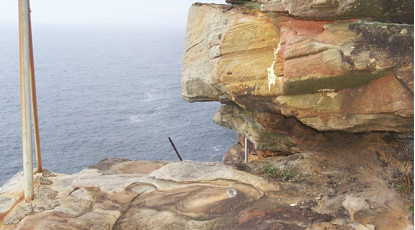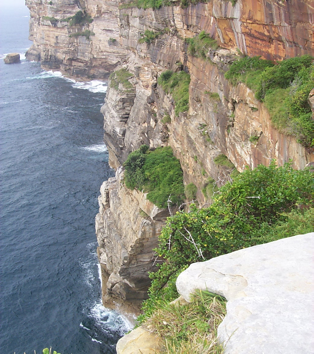The End of Lancaster Road by Peter Bowes
He stopped at the top of the street and sat there awhile, with just the rumbling mechanics of the bike tickling his groin, he sat there looking down his exit flightpath with its parked cars and dawn quiet before a surge of triumphal joy welled up so big in him that he nearly lost his seating as the bike squirted forward and fled down the incline and through the white pickets bordering the end of the road that spun up hard and splintered into his face blinding him so that the last he felt was the rushing wind and the last he heard was the accelerating scream of his bike as it skidded through the grass hummocks and burst onto the stone platform that girded the edge of the cliff that was the edge of the abyss of his life.
Lester Brown taught us how to fish for Luderick; he was a twenty-three year old man who used to ride his green Speedwell bicycle from Vaucluse to the end of Lancaster Road every Saturday and Sunday morning, and after pushing his bike into a handy bush he would stroll along the clifftop pathway and disappear down and along the first of the many ledges that led to the fishing platforms at the bottom of the cliffs.
Sometimes we followed him a little way along to the first ledge before losing our enthusiasm. Lester though would amble along the airy ledge and swing down on one of the steel bars that led to another lower level, his bag over one slim shoulder and a couple of cane rods loosely held in his left hand, leaving a slight aroma of rough shag tobacco from the ready-made cigarette that never left his mouth.
Then we would scoot up to the stone platform that overlooked the drop and we’d lay heads over the top of the precipice and wait the twenty minutes it took until Lester walked out onto the rock platform three hundred feet below, where sometimes he would look up and wave to us.
How dark and cold it looked down there on a winter’s morning, with the grey sea bouncing back on itself after colliding with the cliff’s sandstone base.
Lester managed to get us all to the bottom over one summer, and once we were on the platform and huddled underneath that massive and overbearing shadow his first lessons were to teach us how to read the approaching swell, and how to get to the panic spot when the expected rogue set showed up.
‘ There will always be one wave, ‘ he said, ‘ and it will be bigger and quicker than any other that has come in all day, and it will be silent.’
He had a clear eye did Lester, and watching him watching the sea was like seeing a radar screen roam the horizon. Lester had the thousand-yard stare of an eagle, and he could scan the distance in minute and practiced increments. On slow days he would challenge us to count the boats at sea, and he always doubled our count, and we never doubted him.
The first ledge
Lester showed us where to keep our bags dry and how never to turn away from the ocean.
He taught us about the ten, fifteen and forty-five minute swell patterns, he showed us how swell from the south hit the platform in a different pattern to that from the north, and that from the east.
Summer mornings were best, when the sea was quiet and the early sun turned the cliffs golden and a boy would leave his rod and find a fallen boulder to sit upon, out of sight of all the others, and there he would gaze out at the horizon and into its limitless depth.
Sometimes, when we were strung out behind him out on the vertical ladder that provided a route to the third ledge, midway up, going home – a ladder whose iron supporting bolts had not only shrunk with rust but were being inexorably pulled out of their sandstone pockets everytime someone took a trip up or down, – Lester would stop for a moment,
– he’d look out to sea, take a breather, adjust his rods, then look down and ask if we were all ok.
We were just fine Les, one hundred and fifty vertical feet down and one hundred and fifty vertical feet up on a fifty-year old wooden ladder that rattled in the wind.
A cliff in dark afternoon shadow now, other kids up there in the other world, in the sunshine, probably waiting for the bus to take them home from the beach; our parents thinking we were elsewhere, – and of course no-one with any fish, except for Lester, who always had a bagful.
Anyone who panicked here was banned forever.
We always went home with at least one of his fish, Lester always caught that many.
About the time we gave away fishing to try surfboard riding Lester stopped coming around. Nothing unusual in that, he just wasn’t seen again riding down to the end of Lancaster Road on weekends with his flight bag and his rods anymore, – and the last time we went back down we found that the ladder had finally been ripped away.
After a couple of summers we had just about forgotten about him, and by then we had cars and girls and weekends down at the Farm and Ulladulla.
After a couple of decades we had just about forgotten about each other, by then we had adult children, management careers and cancer.
Franco Lucic was a Council gardener and on September 15th 2007 he and his team started on a two week clean up of the reserve that borders the cliffs from the end of Lancaster Road and down to Rosa Gully.
Acres of Coprosma had to be cleared away from the walkway and on the fifth day, as Frank was hacking into the centre of one of the oldest bushes, his machete hit metal.
He had to call for help to disentangle the green Speedwell from the forty-three years of growth that had swallowed it.
The bike had rusted away to filigree, it was unrideable, worthless, – so they threw it over the cliff.
– Peter Bowes



awesome story peter
cheers Marcus, what didn’t get included in the yarn was the habit of one of the blokes who, when he was ahead of us on the ladder going up, would stop and take a leak over everyone strung out below him –
you only got caught in that trap once – ..
beautiful, laz. have you been back down in recent years?
I took those pics about 3 years ago and near shite meself going to the edge again – no way could I get down now
Peter
Just showed my girlfriend this story.
we are debating whether he went over the cliff?
Regards
Marcus
he never came back to pick up his bike, the ladder broke when he was going down
there’a frightener like that next to St Pat’s stone wall at Manly.
did you ever go over the top?